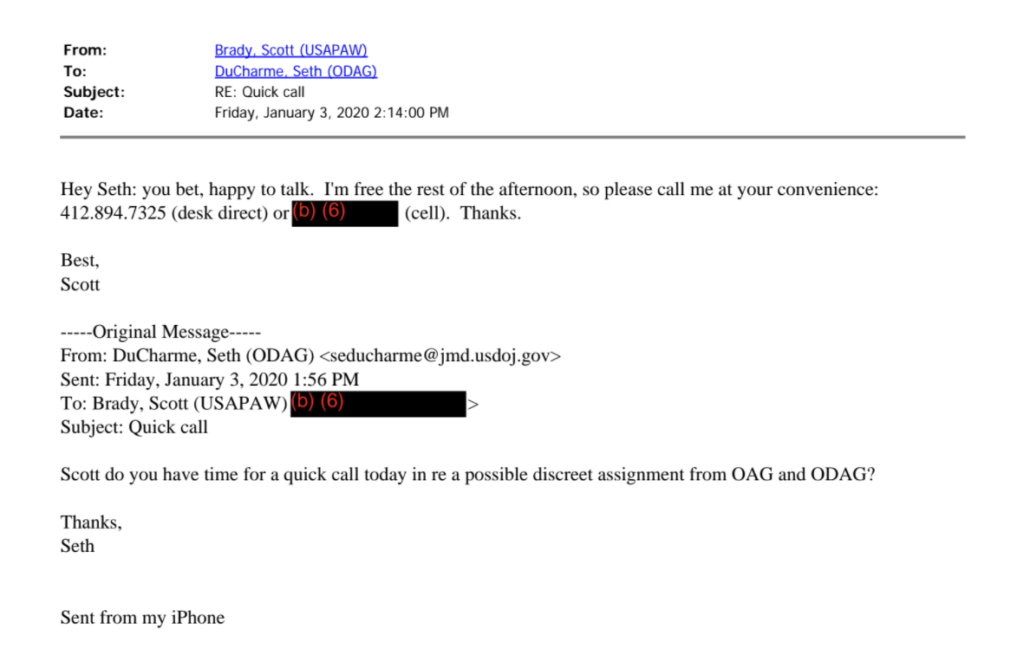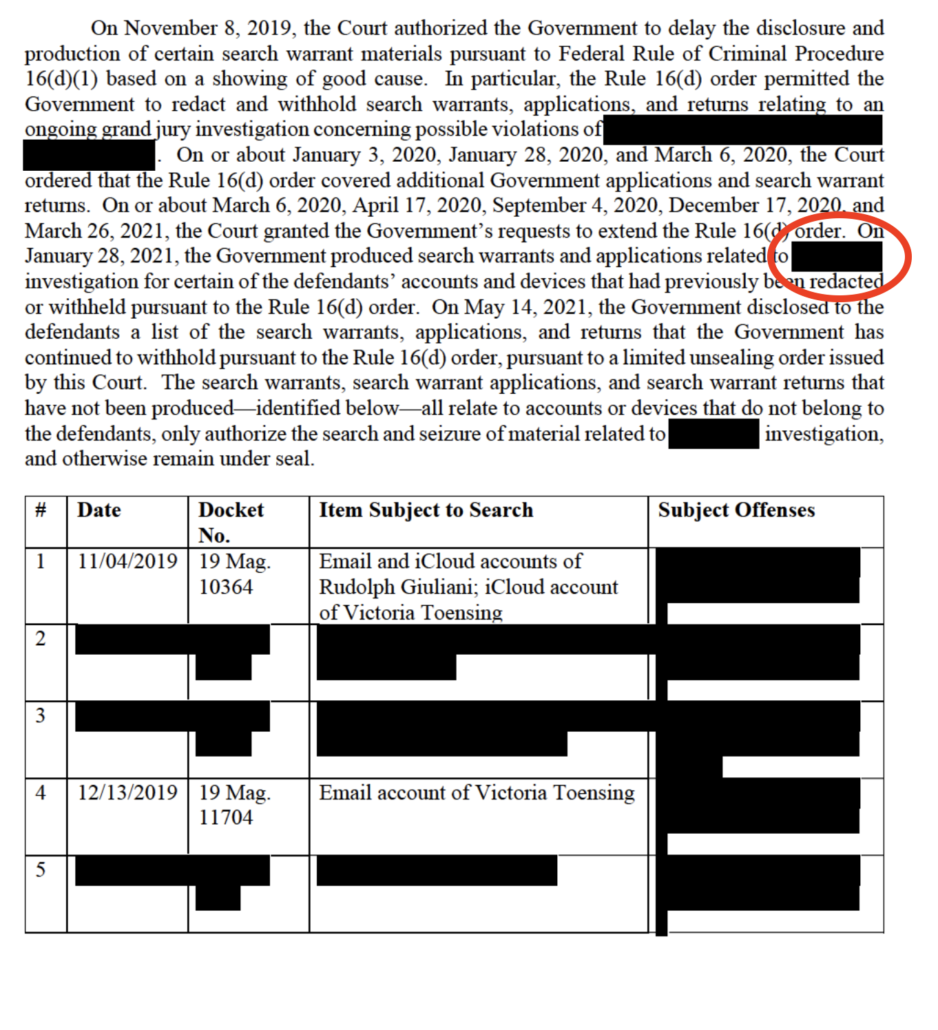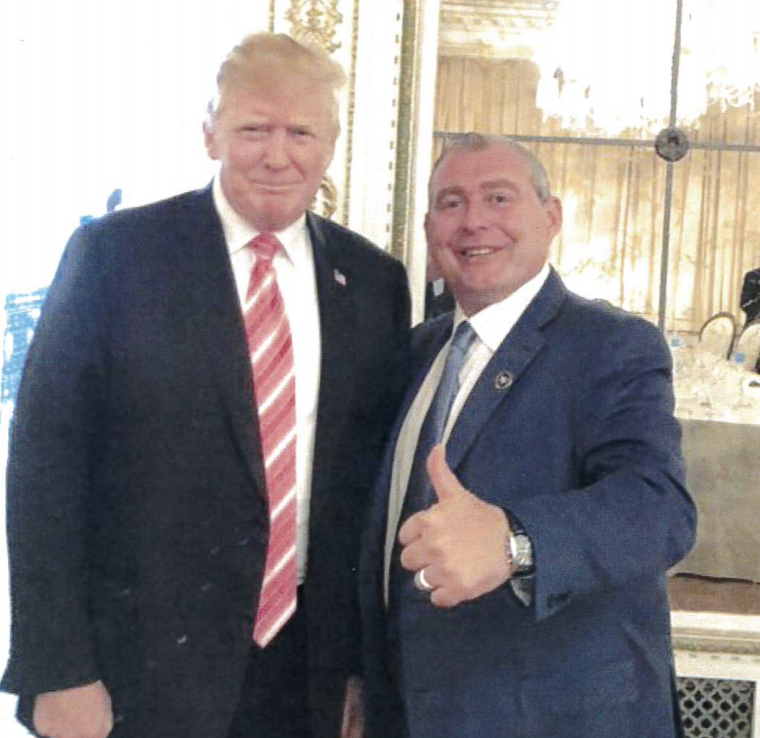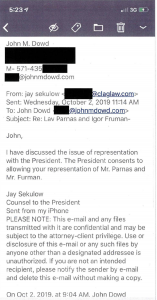The “Subject” of Robert Costello’s Declination
Since April, the SDNY investigation into whether Rudy Giuliani worked as an unregistered foreign agent for Yuri Lutsenko has gone dark. I thought it possible that it had reached a dead end, but figured we’d learn if that were true when Rudy’s lawyer, Robert Costello, noisily announced that prosecutors told Rudy he was no longer a subject of the investigation.
Costello gave a version of that announcement yesterday to the NYT and at least one other outlet.
Only, he didn’t announce that prosecutors had told him Rudy was no longer a subject. On the contrary, Costello appears to confirm that Rudy remains a subject of investigation at SDNY. Costello used a different event — the return of Rudy’s seized devices — as his basis for saying he probably won’t be charged in the Lutsenko inquiry.
Because a broad swath of people routinely misrepresent what I have or am saying about Rudy, let me be very clear: I have no reason to doubt the NYT reporting or Costello’s claim that the investigation that Jeffrey Rosen intentionally circumscribed in 2020 into whether Rudy failed to register for his work for Ukrainian official Yuri Lutsenko will likely not result in charges.
But the specifics of what Costello said and did not say are of interest.
Before I look at what Costello said, a reminder that SDNY seized Rudy’s devices in April 2021. In September, they got Judge Paul Oetken to approve their preferred scope for a Special Master review of Rudy’s phones to include for review everything, regardless of subject, after January 1, 2018. In November and January, Special Master Barbara Jones turned over materials to the government. Half of the devices she reviewed covered just a focused period specific to the Ukraine investigation December 1, 2018 through May 31, 2019; the rest covered the entire period of review, January 1, 2018 through the April 2021 seizure. After Jones finished her privilege review, the material she turned over would be scoped (meaning, sorted for the material that matched the warrant(s) against Rudy) by the FBI. Jones’ last publicly posted report actually showed that the review of the single phone seized from Victoria Toensing’s phone was ongoing, with the involvement of Dmitry Firtash. Firtash had been represented by Toensing when the phone was seized but is now represented (again) by Lanny Davis. The last we heard from Jones in this case on January 21, she said, “I will confer with the Government and counsel for Mr. Giuliani and Ms. Toensing regarding additional review assignments.”
In March, in the related SDNY counts, Lev Parnas filed to change his plea on the remaining charge against him and pled guilty on March 29. At a sentencing hearing on June 29 where the government scoffed at Parnas’ claims of cooperation and associated media blitzes, Judge Oetken sentenced Rudy’s former associate to 20 months in prison. That’s relevant because one identifiable source for yesterday’s NYT story was Parnas, who in fact telegraphed something was coming the day before. Parnas, it seems, has reason to believe Rudy and he won’t be charged for his Lutsenko work (this work was actually included in Parnas’ original 2019 indictment, but was removed in 2020).
The day before Parnas telegraphed such a story was coming, DOJ asked to unseal a July 29, 2021 Oetken opinion finding that a communication describing efforts that Alexander Mikhalev was making to hide his role in influence-peddling relating to some cannabis businesses in the US was crime-fraud excepted.
I believe what’s left was for Igor and Lev to establish who is going to be shareholder(s) of the NewCo and could we all use LLC’s as our proxy’s in it. I am just trying to establish core structure and how transparent should Andrey be exposed for the benefits of NewCo Transparency, his Russian roots and current political paranoia about it.
My wildarse guess is DOJ wants this unsealed so a different Federal entity can use the email to sanction Mikhalev for foreign influence peddling, but that’s just a WAG. SDNY’s letter asking for the unsealing reflects having obtained permission from Parnas’ attorney before the unsealing, so even though SDNY believes Parnas unreliable for the way he blabs to the press, there was recent communication with him on this point.
Back to Rudy. When last we heard, in April, CNN reported that SDNY might soon reach a charging decision on Rudy’s case because he provided investigators some possible passwords for several (the numbers here are inconsistent with the Special Master’s numbers) of the phones FBI couldn’t unlock.
Federal prosecutors may soon reach a charging decision regarding Rudy Giuliani’s foreign lobbying efforts involving Ukraine, after he helped investigators unlock several electronic devices that were seized by the FBI, according to multiple sources familiar with the probe.
Giuliani has also offered to appear for a separate interview to prove he has nothing to hide, his lawyer told CNN, renewing a proposal that federal prosecutors have previously rebuffed.
That, CNN’s sources claimed three months ago, could lead to a quick decision.
In recent weeks, Giuliani met with prosecutors and during the meeting he assisted them in unlocking three devices that investigators had been unable to open, according to people familiar with the investigation. It is unclear if Giuliani also answered questions from investigators during this meeting.
Giuliani provided a list of possible passwords to two other locked devices, the people said. Is it unknown if those passwords successfully unlocked those devices and how much relevant material is on the recently unlocked devices.
Now that several more devices are unlocked, that could speed up the review and ultimately lead to a quick decision over whether the former mayor of New York will face criminal charges. Unless new information comes to light that leads to new routes for authorities to pursue, federal prosecutors at the US Attorney’s Office in the Southern District of New York — which Giuliani led in the 1980s — are likely to decide whether to bring charges soon after the review, people familiar with the matter told CNN.
Even then, the anonymous sources talking about Rudy’s case suggested he would only be charged if new information came to light.
That claim showed up in yesterday’s NYT story, as well: DOJ had enough to seize Rudy’s devices, but found no smoking gun. Yesterday’s piece even linked the CNN story from April, which had suggested Rudy had met with prosecutors “in recent weeks,” but this time dating the meeting to February, so months before CNN reported that a recent event meant a decision was imminent and at least five months ago from today, and clarifying that Rudy had answered prosecutors’ questions.
One key new piece of news, however, was that DOJ had recently returned Rudy’s devices.
While prosecutors had enough evidence last year to persuade a judge to order the seizure of Mr. Giuliani’s electronic devices, they did not uncover a smoking gun in the records, said the people, who spoke on the condition of anonymity to discuss a federal investigation.
The prosecutors have not closed the investigation, and if new evidence were to emerge, they could still pursue Mr. Giuliani. But in a telling sign that the inquiry is close to wrapping up without an indictment, investigators recently returned the electronic devices to Mr. Giuliani, the people said. Mr. Giuliani also met with prosecutors and agents in February and answered their questions, a signal that his lawyers were confident he would not be charged.
We can assume that detail — that DOJ returned Rudy’s devices — likely came from Robert Costello because (as happens increasingly these days), another outlet — Reuters — quoted Costello on the record saying what NYT had granted someone anonymity to share.
FBI agents recently returned the cell phones and other electronic devices they had seized from Donald Trump’s former attorney Rudy Giuliani, in a possible sign the investigation into whether he failed to register as a foreign agent of Ukraine could be winding down, his attorney said on Wednesday.
Robert Costello, Giuliani’s lawyer, told Reuters he has not been officially notified yet whether federal prosecutors in Manhattan are closing the investigation.
But he said the return of the devices is a positive sign for his client.
“I have not been officially told that its [sic] over,” Costello said. “It is possible they could make some startling new discovery…but we have always been confident that he didn’t do anything wrong.”
The primary other new piece of news in the NYT story describes documents and texts — the likes of which have recently been returned to Robert Costello — detailing a purported review of Rudy’s contacts with Dmitry Firtash that started in June 2019.
Mr. Giuliani began contacting Mr. Firtash’s lawyers in June 2019 seeking information about corruption in Ukraine, around the time Mr. Trump was pressing Ukraine’s president, Volodymyr Zelensky, to investigate the Bidens. Mr. Firtash’s lawyers told Mr. Giuliani they did not know of anything relevant.
There is no indication Mr. Firtash assisted Mr. Giuliani in his attacks on the Bidens, and Mr. Davis said the oligarch “categorically denies ever helping Giuliani or anyone else in any effort to dig up dirt.”
Even so, in the summer of 2019, an associate of Mr. Giuliani, Lev Parnas, met with the oligarch and recommended he add new lawyers to his team, the husband and wife, who were helping Mr. Giuliani dig into the Bidens. Mr. Parnas was paid to serve as their interpreter, and Mr. Firtash agreed to pay for some of Mr. Parnas’s travel expenses.
The offer seemed ideal. Around this time, Mr. Giuliani was preparing to go to London, and wanted to determine who would cover his travel. “Running into money difficulties on trip to London,” Mr. Giuliani wrote to Mr. Parnas in a text message.
During the trip in late June, Mr. Giuliani met in a hotel conference room with some Firtash associates, including a banker whose cousin was a Burisma executive.
Mr. Davis said the purpose of the meeting was to discuss Mr. Firtash’s contention that his extradition was politically motivated, and his associates did not talk about Burisma. The oligarch’s associates did not seek Mr. Giuliani’s help, Mr. Davis added.
That day, Mr. Giuliani upgraded hotels to the Ritz London. Mr. Firtash’s company, Group DF, later covered the roughly $8,000 stay, interviews and records show. The next month, the company paid $36,000 for a private flight Mr. Giuliani took from the Dominican Republic to Washington. And that August, Mr. Giuliani traveled with a friend and a bodyguard to Spain at a cost of more than $30,000, an expense that was listed on an invoice to a Group DF assistant and a longtime adviser to Mr. Firtash.
Mr. Costello said that Mr. Giuliani “doesn’t know how it came about.”
Note: Much if not all of this activity pertaining to Firtash post-dates the temporal scope, which ended on May 31, 2019, of Jones’ prioritized reviews. For eight of Rudy’s phones, the privilege review would not (based on public records, anyway) have been complete on materials after that period when Rudy met with prosecutors in February. The material would be in the temporal scope of the known warrants, which extend through December 2019, but not the Special Master review of eight devices.
Firtash’s name also didn’t appear in Parnas’ description of the scope of the inquiry that he released via redaction fail last year.
In a chart, the Government identified that it had sought and seized a variety of undisclosed materials from multiple individuals, including: the iCloud and e-mail accounts of Rudolph Giuliani (11/04/19); the iCloud account of Victoria Toensing (11/04/19); an email account believed to belong to former Prosecutor General of Ukraine, Yuriy Lutsenko (11/6/19); an e-mail account believed to belong to the former head of the Ukrainian Fiscal Service, Roman Nasirov (12/10/19); the e-mail account of Victoria Toensing (12/13/19); the iPhone and iPad of pro-Trump Ukrainian businessman Alexander Levin (02/28/2020 and 3/02/2020); an iCloud account believed to belong to Roman Nasirov (03/03/2020); historical and prospective cell site information related to Rudolph Giuliani and Victoria Toensing (04/13/2021); electronic devices of Rudolph Giuliani and Giuliani Partners LLC (04/21/2021); and the iPhone of Victoria Toensing.
If there were any SDNY investigation into Firtash, you would expect to see warrants targeting his cloud content as well. It wasn’t in the warrants that Parnas had seen at the time of seizure.
So one thing this story (which also relies on Firtash lawyer Lanny Davis as a source) does is compare notes between suspects about the scope of SDNY’s interest in Rudy’s contact with Firtash. As NYT notes, it actually reveals that the investigation into Rudy was broader than previously known, and broader than the scope of the known warrants as described by Parnas.
In any case, what Costello told Reuters and presumably told NYT is that 1) he recently got these phones (content from which likely contributed to this story) back and 2) SDNY has not told him that Rudy is no longer a subject.
Generally, if DOJ seizes items as part of a grand jury investigation, they can keep them:
- So long as the grand jury investigation in which the property was seized is ongoing
- Until such time as FBI fully exploits the devices (that is, until they crack passwords and identify deleted content)
- During the pendency of a Special Master review
- For use in a charged prosecution if the validity of an extraction might otherwise be challenged
This response to Project Veritas’ efforts to get their phones back in a different SDNY investigation lays out the precedents in the District. If the grand jury investigation is closed, the subject of the investigation gets their property back, and Rudy has gotten his property back. So Costello fairly concludes that the known grand jury investigation into Rudy has been closed.
The thing is, if those materials are used for any other investigation — particularly now that they’ve been reviewed for privilege with kind of involvement from Costello that would amount to stipulation about the accuracy of the exploitation — would not be shared around DOJ as actual devices, some imaginary bag of Rudy Giuliani’s many phones passed from FBI agent to FBI agent. They’d be shared, via separate warrant from separate grand jury investigations, on hard drives of the post-privilege review content.
Costello can say with some confidence the grand jury investigation opened in 2019 won’t result in charges. But he doesn’t have a good explanation for why even SDNY has not told him Rudy is no longer a subject.
A more interesting part of the timing, to me, is that before Rudy got his devices back, a different part of DOJ obtained two rounds of subpoena returns from at least a dozen people asking (among other things) for all their post-October 1, 2020 communications to, from, or involving Rudy Giuliani or Victoria Toensing. Some of the people receiving those subpoenas would be hostile witnesses, themselves possible suspects of a crime. DOJ started, though, with people who had refused to take part of the fake elector scheme, who presumably could be expected to fully comply with the subpoena, including providing any Signal, WhatsApp, ProtonMail, or Telegram communications that might otherwise be unavailable.
The FBI likely has enough sets of subpoena returns including Rudy’s comms to know what content should be on his phones from when he was helping to plot a coup.
That’s the kind of thing FBI might have wanted to check before they released Rudy’s phones, to know how aggressively they had to look for potentially deleted content on the devices.






